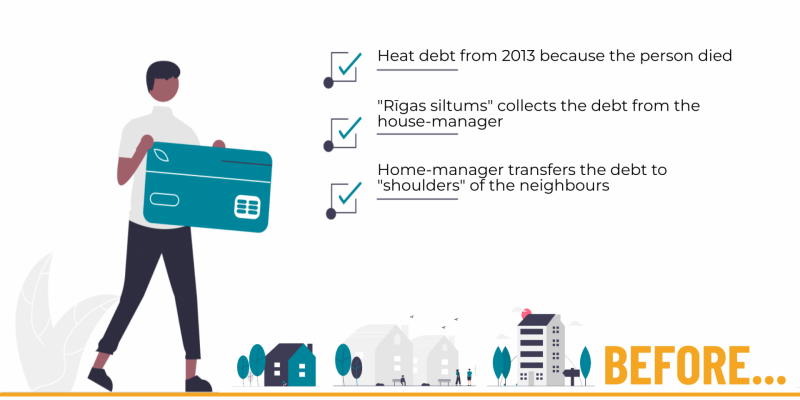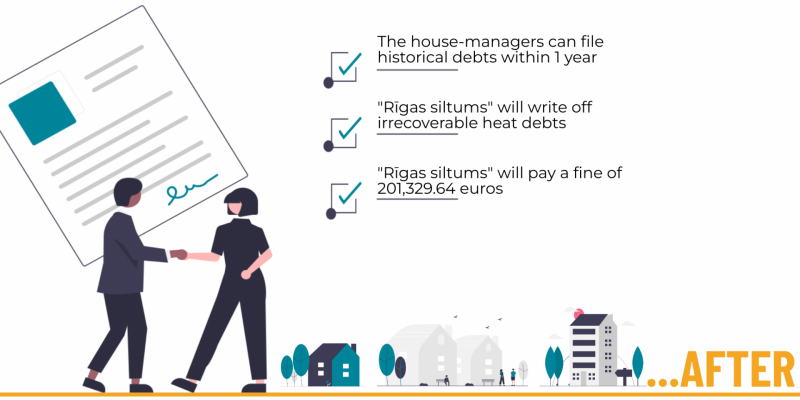On February 7, the Competition Council (the CC) signed a settlement with JSC "Rīgas siltums", which stipulates that the company will cease operating practices, demanding the repayment of debts that are considered irrecoverable in the event of a person's death or insolvency, from house-managers and other apartment owners. The settlement stipulates that “Rīgas siltums” will write off irrecoverable debts and inform the managers of residential buildings, for the buildings of which “Rīgas siltums” supplies heat energy. According to the settlement, "Rīgas siltums" will pay a fine of 201,329.64 euros to the state budget.
The problem of shifting the burden of debts to the managers of residential houses, which in turn recovers debts from other apartment owners in place of their neighbours, has been relevant for years, so on January 15, 2014, amendments to the Law on Administration of Residential Houses came into force, which provided that public service providers were required to repay irrecoverable debts in accordance with the law. Irrecoverable debts can arise, for example, in the event of a person's death, in a case of a sale of the escheated persons' property, there are insufficient funds to cover the outstanding obligations, and as well as in the case of a person's insolvency, when the debts are declared irrecoverable by a court decision terminating the insolvency proceedings.
Considering the amendments to the law, in 2014 “Rīgas siltums” started repaying irrecoverable debts. However, only those debts that have arisen after the amendments to the law or after 15 January 2014 were repaid. Whereas the requests of the managers of residential houses to write off irrecoverable debts that had arisen before the Law on Administration of Residential Houses came into force were rejected by "Rīgas siltums" due to the lack of special regulation in the industry.
After the CC had initiated an infringement case against "Rīgas siltums" for abuse of a dominant position, "Rīgas siltums" informed the CCP that the company had changed its previous practice, thus extinguishing a debt that arose before the amendments to the law were made. However, only debts that have historically been settled but at the same time the person's insolvency or death occurred after 15 January 2014 have been written off. Despite the change in the company's practice, the CC concluded that the debt was not repaid consistently in all cases thus the exploitative practice continued during the investigation of the infringement.
Considering the evidence established in the CC's case, as well as the fact that the legal dispute exists regarding historical debts that arose before January 15, 2014, as well as "Rīgas siltums" commitment - to write off irrecoverable debts - the parties have agreed to settle the dispute by concluding a settlement. The administrative agreement stipulates that “Rīgas siltums” will write off irrecoverable debts, while information on the debt write-off practice will be published on its website www.rs.lv and sent to residential house-managers. During next year the residential house-managers have the opportunity to inform "Rīgas siltumu" about irrecoverable debts that have arisen until January 15, 2014. According to the settlement, "Rīgas siltums" will pay a fine in a total of 201,329.64 euros to the state budget.
Any company against which the Competition Council has initiated an infringement case may use the opportunity to conclude a settlement by acknowledging liability for the infringement on its own initiative and providing all the information necessary for the decision of the Competition Council. This allows for faster detection and correction of the infringement and saves the resources normally required for investigations and possible litigation, thus reducing the fine for the company. Settlements are also often used in the practice of the European Commission and competition supervisors in the many EU Member States.




